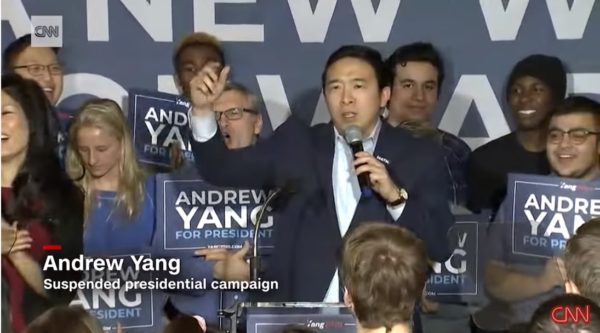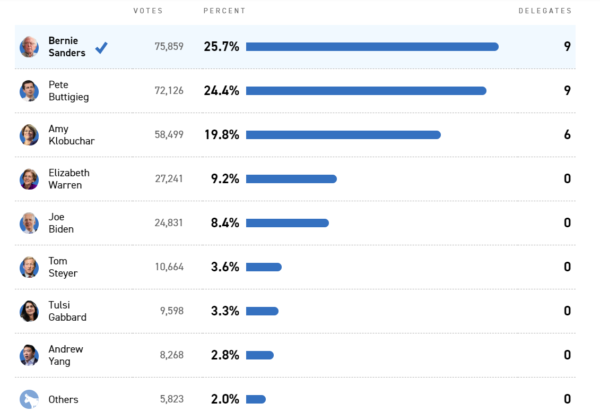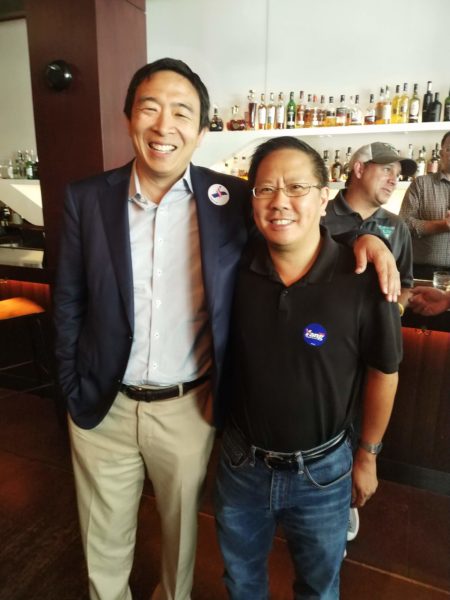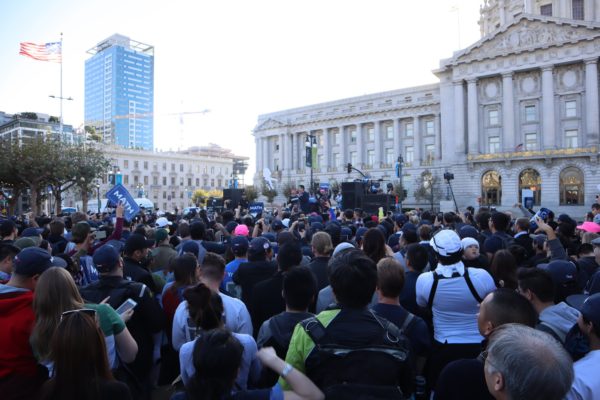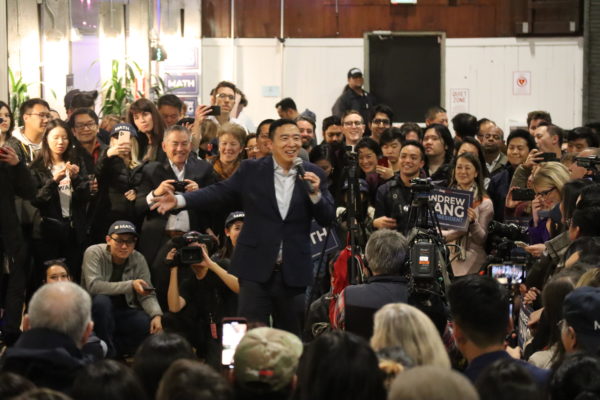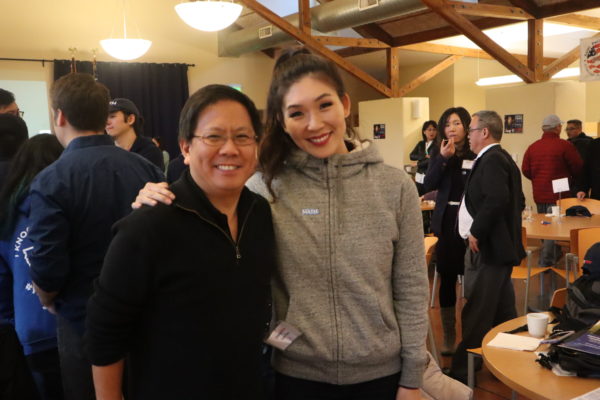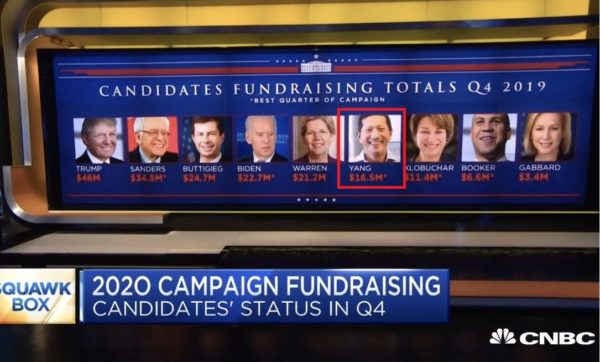Shortly after the closing of the New Hampshire primary polls, Democratic presidential candidate Andrew Yang announced (to my surprise) the suspension of his campaign. His stated reason:
“Before the Iowa caucus last week, Yang and his aides had held out hope that his poll numbers would translate into more votes than they actually did. When they didn’t, and when the votes didn’t seem to be there in New Hampshire either, they decided it was time to leave the race, as he planned to do in a speech tonight. …
Yang’s centered his campaign on what he called “humanity”—the idea that politics should recognize the “intrinsic value” of people, and not just their economic value. In an interview last night, he framed his decision to quit the race in these same terms.
“I don’t want to take people’s money and time and support if I genuinely don’t think that we can contend and win …””
I appreciate Andrew’s honesty, as I think if he was running for his own ego, he would continue to raise more money and stay in longer. I was hoping he would last at least until Super Tuesday (March 3rd). Personally, when I saw the final poll results, I was kind of shocked:
I could not believe that Andrew came in dead last, behind Tom Steyer (maybe he spent big on TV advertising in New Hampshire – which I’m sure he did) and Tulsi Gabbard (who was not in the last two debates, but also campaigning a lot in New Hampshire instead of Iowa). I was also surprised that Amy Klobuchar had beat out neighboring Senator from Massachusetts, Elizabeth Warren. This goes to show how often we can be absorbed in our own Facebook, Twitter and YouTube bubble and not realize the bigger picture of how the campaign was going. I recall the polling prior to the primary had Andrew higher than the final result. I have also read that there were a lot of undecideds, and the debate the Friday before the Tuesday primary – Andrew did not have a great performance (and as usual, the least amount of time to speak) – helped a lot of undecideds decide on their candidate.
In the end, I think the desire to beat Trump in a crowded field and the ignorant (in my opinion) skepticism around Andrew’s signature platform of the ‘Freedom Dividend‘ of $1,000 a month (Universal Basic Income (UBI)) for every American adult citizen. I still think his run was influential. Andrew, much like how Senator Bernie Sanders in 2016 moved the needle on Americans towards universal healthcare, introduced the idea on the need for Universal Basic Income, especially in the upcoming destruction of jobs through Artificial Intelligence and automation.
Andrew was always going to have an uphill battle for someone who had never run for public office, let alone run for president. Much like Bernie’s run in 2016, Andrew’s run in 2020 will probably lead him to do bigger and better things – and even possibly run for Mayor of New York City in 2021 (according to the rumors) and again for president in 2024. Running for mayor and winning)would also alleviate another cricitcism of Andrew having never served in public office. We will have to see what Andrew does next.
For now, Andrew hasn’t endorsed anyone and said he’d only endorse a candidate who comes out for supporting Universal Basic Income:
With Andrew’s presidenial run over, I wanted to reflect my thoughts on his historic journey.
I first met Andrew Yang in July 2018 (yes, 2018!) at a San Francisco fundraiser and interviewed him for 8Asians.com a few weeks later and published that interview in September 2018. At the time, I had never heard of him and I didn’t think his chances were that high of getting any traction. He was a political unknown and had never run for public office before. As Andrew has often said, his campaign was often underestimated.
When people study his campaign, they will note that Andrew’s non-traditional route – through podcasts, bloggers and non-traditional “MSM” – Main Stream Media – help him break through. And the podcast that helped break him into the mainstream, was the Joe Rogan Experience – which coincidently, happened exactly a year ago today (Feb 12, 2019). I remember talking to a friend of mine who started as a full time campaign staff hire back in January 2019 that there were periods of time if the campaign prior to that podcast that they wondered if the campaign was just spinning its wheels.
I later got invited to a fundraising dinner in the Fall of 2018 in the San Francisco Bay Area, and also saw him speak at a small venue in March 2019 in Campbell, CA,
and then at his rally in October 2019, which was like a rock concert in terms of crowd enthusiasm.
a San Francisco fundraiser in January 2020, and at a private event the next day.
With so many candidates, the chances of Yang making it on to the debates and outlasting several governors and senators has been amazing to see.
What inspired me even more was that Andrew energerized Asians Americans, many who had never been active and involved in politics before, become active and involved. Ever since I became politically active in 2004 (I was against the Iraq invasion) and blogging in 2007, I have been constantly annoyed at the Asian American community for being so apathetic to civic engagement (especially living in the San Francisco Bay Area, which is approximately 25% Asian):
- San Mateo Presidential Straw Poll – Where are you Asian-American? (10/22/07)
- Obama San Jose Office Opening – Where Are You Asian Americans? (9/26/08)
- Taiwanese Americans Are Politically Active For Taiwan, But What About US Politics? (10/18/11)
- Election 2012: Asian Americans Voter Turnout Declined from 2008 and Lowest Amongst All Races (5/17/13)
Additionally, for the past 3 years, I’ve atttend almost every Trump-related protest in the San Francisco Bay Area, and have almost always been disappointed at the lack of Asian Americans pariticipating (barely any relative to representation – maybe 1% to 5% of the partipants). If Asian Americans want to be seen as “real” Americans, they should be civically engaged, like caucasians, African Americans, and Hispanics, etc. So when I started to see Asian Americans (and all Americans of every race and creed) get excited about Andrew, that gave me hope for the future, especially as a Californian.
As Jeff Yang, American writer, journalist, businessman, and business/media consultant, eloquently wrote on CNN.com:
“Though Yang is dropping out now, after an incredible, historic run, he unquestionably accomplished that goal. He proved that a sizable segment of the US electorate can imagine an Asian American in the White House — putting a crack in the glass ceiling for a population that has always been treated as more of a source of campaign donations than a pool of national leadership talent.
As he regularly said in interviews, he could “vividly remember what it was like growing up a young Asian boy very rarely seeing someone who looked like me on TV at all, unless it was in the context of a kung fu movie. …It makes me very happy and proud to help others see that there are no limitations on the way you can contribute and lead in this country.”
…
In less than a year, he went from being derided as a novelty candidate to being treated as a genuine primary rival, and an important thought leader, seeding the Universal Basic Income concept, what he calls the “Freedom Dividend,” into the mainstream of the Democratic agenda. Elizabeth Warren said she’d read Yang’s New York Times-bestselling book, “The War on Normal People,” and was “open” to the idea, while Buttigieg, Julian Castro and Tulsi Gabbard all expressed interest in UBI experiments and pilot programs.
Yang did all of this with minimal resources and viral support, leveraging a vast network of Asian American connections and the passion and extraordinary energy of the “Yang Gang,” his extremely online supporters.
…
But as I noted on Twitter upon reading the news: Yang didn’t just make history — he unquestionably put a sizable dent in the future as well. He’s earned himself an ongoing place in the national conversation. He established the resources and support to be taken very seriously in any campaign or organization he might launch going forward.And if Obama was the first mobile-app-driven candidate of our digital era, and Trump the first social-media-driven one, Yang was the first to crowdsource himself into relevance, which will surely change the landscape of politics forever.
The promise that in America “anyone can grow up to be President” has never felt more real, and for that, Andrew Yang deserves our thanks.”
As I had wrote back in 2008:
The fact that we haven’t even seen a *fictional* Asian American president on a major television network or show or film (that I can ever recall) is kind of sad. So when Andrew ran for president for real, that really helped inspire and excite the Asian American community. Andrew is the Jeremy Lin of presidential candidates – awakening the idea that something once inconceivable, is actually for real. And no doubt, he will have encouraged more Asian Americans to run for public office and for president.
Andrew is not the first Asian American to run for president. Technically, I think it may have been Congresswoman Patsy Mink, who ran a very brief run (you should watch this inspiring documentary on her – it made me cry). Governor Bobby Jindal ran for president back in 2016 , but didn’t last very long while trying to become the Republican nominee). Senator Kamala Harris dropped out in early December 2019 and Congresswoman Tulsi Gabbard is still in the race. But Andrew has certainly made the biggest push and impact of any Asian American to have run for office of the presidency:
“The son of Taiwanese immigrants, Mr. Yang was one of about a half-dozen viable Asian-American candidates to ever run for president. He became something of an involuntary torchbearer for Asian-Americans as he grappled with how to discuss his identity on the trail and how to address and confront racism. … But two days after Mr. Yang’s underwhelming performance in Iowa, his campaign laid off dozens of staff members from a team that had ballooned from fewer than a dozen people to over 200. … Despite having raised more than $30 million over the course of his presidential campaign — a remarkable sum for a political outsider — Mr. Yang’s team had only $3.7 million in cash on hand at the start of this year, according to federal filings.”
He had over 400,000 contributors, as of the last filing.
Hopefully Andrew has inspired Asian Americans everywhere to get more involved in civic society, run for public office and inspire all Americans to get involved. I know for Korean American Paget Kagy (who I came across her YouTube channel), an actress/producer/director previously politically disengaged, Andrew lit a fire under her and became one of Andrew’s most vocal and passionate supporters, rallying the Yang Gang, to donate and volunteer.
Paget Kagy & me – January 2020
Paget posted daily videos on Andrew and the campaign – and it was truly inspiring to see how driven she was. I hope she stays engaged in politics and civic engagement. I can understand why people get disillusioned or don’t find politics interesting or need a candidate to be inspired, but at the very least – vote! (Asian Americans have one of the most dismal voter turnout rates—47 percent—compared to 66 percent for black voters and 64 percent for non-Hispanic white voters.)
There was also this white trucker (and I believe former Trump supporter) with the moniker ‘Fred the Felon’ on YouTube and Twitter (who I saw in San Francisco on stage wih Andrew) who was a super passionate advocate of him – driving his truck all over the United States promoting Andrew Yang & the ‘Freedom Dividen’
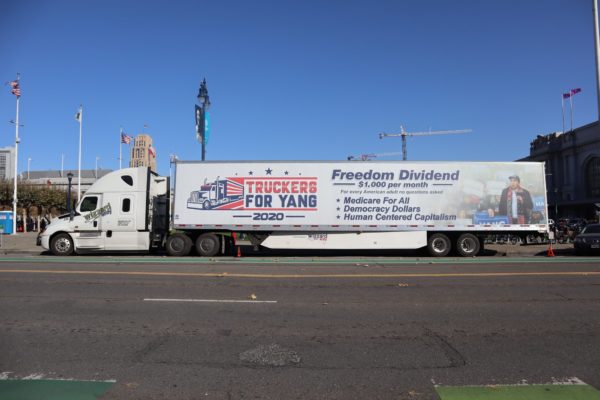 October 2019 – San Francisco, California
October 2019 – San Francisco, California
Again, seeing Americans of all backgrounds, but especially non-Asian supporting Andrew was a glimpse of what Asian Americans can been seen as – doing anything other Americans are doing – being NBA basketball players, Crazy Rich Asians, Representatives & Senators, and yes, presidential candidates.
One thing I enjoyed and learned from Andrew is to try to listen, before speaking – and not to demonize those who have political difference from me. I have a long, long, long way to go on this! Andrew brought in a lot of disaffected voters to get involved, as well as former Trump supporters (search #trumptoyang on Twitter).
Additionally, Andrew’s campaign taglines of “Humanity First,” “Not Left, Not Right, Forward” as well as his case for human-centered capitalism, where’s one self-worth is not determined by the market, I think resonated with a lot of people.
Andrew was the happy warrior – making a case for himself, praising other presidential candidates. He is also problem and solutions oriented, and not idealogical – and that gave him a lot of crossover appeal by Republicans and Independents who are turned off by partisanship.
CNN contributor Van Jones succintly described Andrew, his policies and his character and campaign:
CNN's Van Jones: Andrew Yang "may wind up being a much more significant voice than we recognize tonight. And also he broke a color barrier — he's an Asian American guy and now that's a thing. You saw a lot of young Asians getting involved" #cnnelection pic.twitter.com/grkSjmw0WT
— CNN Politics (@CNNPolitics) February 12, 2020
Of course, Andrew didn’t run a perfect campaign, no one does. He drew a lot of heavy criticism from a certain segment of the Asian American community regarding his reinforcement of the ‘Model Minority’ stereotypes (including what was initially a joke – the “MATH” campaign hats which turned into an acroynm of ‘Make America Think Harder’ – a stark contrast to ‘Make America Great Again.’) At the time, I didn’t write much about this issue since I didn’t have much time, but Andrew met with some of his detractors back in October:
“Yang’s candidacy has been intensely polarizing within the Asian American community, in part because he has presented discordant views on race and identity. His Asian dad jokes on the campaign trail about how Asians are good at math have sparked accusations that he’s perpetuating the model-minority stereotype. So when journalist Jeff Yang invited me to an off-the-record meeting held last week between Andrew Yang and AAPI activists, I thought it could be a valuable opportunity to clarify. I asked if the meeting, which Yang’s campaign sought, could be on the record. Yang’s campaign agreed. So on Tuesday, about a dozen Asian American writers, activists and media personalities gathered at a restaurant in West Los Angeles. Yang arrived a few minutes late, a “math” pin on his lapel. The meeting was cordial but tense. Yang encouraged us to be as honest as possible with him, even if it meant saying something unfriendly. …
Yang, to his credit, listened carefully, showed self-awareness and adopted an apologetic tone, though he stopped short of offering an apology. He described his tweet comparing Asian racism with black racism as “inartful and imprecise” and said he should have worded it differently. Comparing black and Asian struggles was not productive, and he shouldn’t have done it, he said. He doesn’t have a formal campaign committee to help him craft responses on issues of race. And he expressed pain at the idea that some Asian Americans were ashamed at the way he’d portrayed their culture. He admitted that a campaign built on memes and social media wasn’t a great venue for discussing race. …
He said he didn’t believe his jokes about Asians and math and doctors were harming anyone, and if he believed he was causing harm, he’d stop. He’s trying to feel more natural on the campaign trail and not second-guess himself, he said, by way of explanation. And he asked us for the benefit of the doubt. As an Asian American outsider presidential candidate, he believes he has to make as wide an appeal as possible — even if that means cracking the occasional joke about being Asian. “For me this was and is the best way that I can compete,” Yang said.”
Having met Andrew so early on, I knew early on that he had an interesting sense of humor and was overall a very funny guy. Running for president, being under the scrutiny of the press and your community can be very daunting and you are never going to please everyone. In general, I wasn’t a fan of Andrew’s stereotypes but I didn’t think it was extremely damaging. The fact that Andrew was running for president was already BREAKING a lot of stereotypes, in so many ways and making a POSITVE contribution to the community.
One last time I wanted to comment on and it was the overall media treatment of Andrew. Certainly, Andrew was a non-traditional candidate, but oftentimes, he would be ignored, mistakenly or intentially left out (despite polling higher than others at the time), of even mistakenly referred to other Yang’s – including MSNBC to refer to Andrew as PBS Newshour reporter John Yang and CNBC using Silicon Valley venture capitalist Geoff Yang’s photo instead of Andrew’s photo, leading Geoff Yang to to tweet he wasn’t running for president:
This whole phenomena became to be known as #YangMediaBlackout, and I found one web site that went to document each and every case.
I became more understanding of the public’s distrust of the mainstream media, that there are certain private agendas and narriatives that are favored over others for a non-traditional candidate. And I can certainly understand that maybe early on, the press needed to be a little bit more skeptical prior to the Andrew gaining traction – especially by the DNC’s own debate metrics of polls and donations (and ultimatly money raised). But, for example, compared to how much press that Mayor Pete Butigieg garnered, especially in the beginning given his youth and managing a small city (South Bend, Indiana has about 100,000 people – Julián Castro’s San Antonio, Texas has 14X the population ).
As far as the Democratic debates, Andrew always got shafted on the amount of speaking time. Part of that I think though was that he was often so focused and disciplined on the ‘Freedom Dividend,’ that I think the debate moderators didn’t want to ask him questions? However, Andrew could have also interjected more, though he likened the whole debate process succintly once at a debate during his closing statement as a reality TV show:
Ultimately, in the beginning, the large field of Democratic presidential candidates – the largest apparently in history, helped Andrew – since he was an Asian American and started to gain traction. But now that voting has begun, and there are still a lot of candidates available – and there is a growing concern to consolidate support early to invest in defeating Trump, Andrew faced the odds – or as he often has said, he has done the MATH, and it didn’t look like he could go any further without being true to himself or his supporters.
My cynical cousin long ago commented to me on Facebook that Andrew Yang will long be forgotten, but don’t think so. He’ll certainly be remembered in Asian American and United States history for helping to break the barriers of the highest elected public office in the land until someone does. Maybe it will be Andrew in 2024, or beyond. Andrew is only 45 years old (33 years younder than Bernie Sanders)!
It’s been an amazing ride as part of the Yang Gang. I clearly understood that his chances of winning the Democratic nominations were very slim, though I think he could have defeated Trump (given his crossover appeal – I had Republican friends that mentioned Andrew was the only Democrat they could probably vote for). I certainly hope Andrew won’t be the last Asian American to run for president in my lifetime!
I could go on with more thoughts about Andrew’s run for president, but I think I’ve captured the essence of what I wanted to cover within the time I had to spend. I’ll end with Andrew & Evelyn Yang’s thank you video from his Facebook page:
https://www.facebook.com/andrewyang2020/videos/509127473076621/

